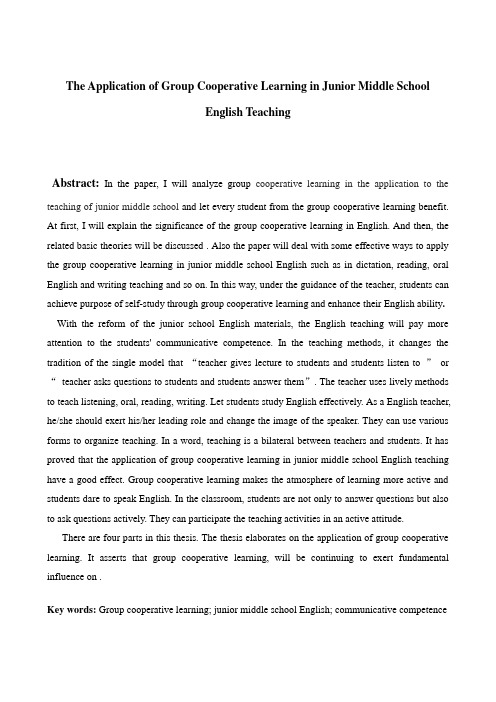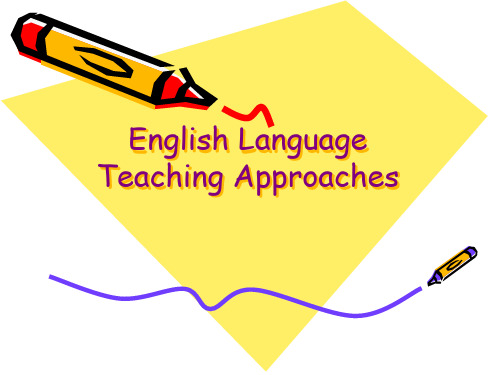简析社团语言学习法及其应用英文
- 格式:pdf
- 大小:346.19 KB
- 文档页数:2

The Application of Group Cooperative Learning in Junior Middle SchoolEnglish TeachingAbstract:In the paper, I will analyze group cooperative learning in the application to the teaching of junior middle school and let every student from the group cooperative learning benefit. At first, I will explain the significance of the group cooperative learning in English. And then, the related basic theories will be discussed . Also the paper will deal with some effective ways to apply the group cooperative learning in junior middle school English such as in dictation, reading, oral English and writing teaching and so on. In this way, under the guidance of the teacher, students can achieve purpose of self-study through group cooperative learning and enhance their English ability. With the reform of the junior school English materials, the English teaching will pay more attention to the students' communicative competence. In the teaching methods, it changes the tradition of the single model that “teacher gives lecture to students and students listen to ”or “teacher asks questions to students and students answer them”. The teacher uses lively methods to teach listening, oral, reading, writing. Let students study English effectively. As a English teacher, he/she should exert his/her leading role and change the image of the speaker. They can use various forms to organize teaching. In a word, teaching is a bilateral between teachers and students. It has proved that the application of group cooperative learning in junior middle school English teaching have a good effect. Group cooperative learning makes the atmosphere of learning more active and students dare to speak English. In the classroom, students are not only to answer questions but also to ask questions actively. They can participate the teaching activities in an active attitude.There are four parts in this thesis. The thesis elaborates on the application of group cooperative learning. It asserts that group cooperative learning, will be continuing to exert fundamental influence on .Key words: Group cooperative learning; junior middle school English; communicative competence小组合作学习在初中英语教学中的应用提要:在这篇论文中,我将分析小组合作学习运用到初中英语教学中去,同样让每一位学生从小组合作学习中受益。



社团语言学习法(Community Language Learning)社团语言学习法又称咨询法(Counseling Learning),产生于60年代初期的美国,是由古兰(Charles Curran)创立的。
这种教学法主要的教学目标是外语口语。
它的突出特点是以学生为中心,教服从学。
教师是顾问,是辅助者,学生是“病人”。
教师注意的中心是“病人”的需要。
另一个突出特点是依靠学生的母语,逐渐由学生的母语过渡到外语。
这种教学法的学习方式和过程是这样的:首先学生用母语建立相互信任的人际关系。
学生坐成一个圆圈,教师在圈外。
学生可以是零起点的外语学生。
如果一个学生想对小组或某个学生说几句话,他就用母语说,顾问就把他的话翻译成外语,然后让学生重复这句外语。
接着,别的学生就用母语回答,顾问再翻译,学生重复。
这样,会话就会继续下去。
如有可能,可以把会话录下来,引导学生归纳出一些有关新语言的信息。
如果学生愿意,顾问可以给更多的指导,解释一些语言规则。
在开始阶段,“病人”中会出现迷惑不解、混淆的情况,但是在顾问的帮助下,会慢慢好起来,开始用外语说一个词、一个短语,不用翻译。
这是“病人”由完全依赖顾问到独立学习的第一个标志。
随着“病人”对外语的逐渐熟悉,直接用外语交际就会发生,顾问的指导就会减少。
数月之后,“病人”就会用外语进行流利的交际。
从完全依赖顾问到完全独立,其间分以下五个阶段:1.完全依赖顾问;2.会说一些外语词和短语;3.逐渐独立,但还有一些错误需要顾问纠正;4.只需要顾问解释一些成语、具有特殊意义的固定表达法和语法;5.独立、自由地交际。
顾问虽出场,但保持沉默。
社团语言学习法的理论基础是人本主义心理学和以学生为中心的教育学。
社团语言学习法旨在创造和谐教学气氛,发挥教师在学生情感因素中所起的主导作用,以降低学生学习的情感障碍,提高外语教学效果。
辅以一些必要的修改,社团语言学习法同样适用于成人教育。
社团语言学习法(Community Language Learning)社团语言学习法又称咨询法(Counseling Learning),产生于60年代初期的美国,是由古兰(Charles Curran)创立的。


●社团语言学习法(Communi tyLang uageLe arning)又称咨询法(Counsel ing Learnin g),产生于60年代初期的美国,是由古兰(Charles Curran)创立的。
这种教学法主要的教学目标是外语口语。
它的突出特点是以学生为中心,教服从学。
教师是顾问,是辅助者,学生是“病人”。
教师注意的中心是“病人”的需要。
另一个突出特点是依靠学生的母语,逐渐由学生的母语过渡到外语。
这种教学法的学习方式和过程是这样的:首先学生用母语建立相互信任的人际关系。
学生坐成一个圆圈,教师在圈外。
学生可以是零起点的外语学生。
如果一个学生想对小组或某个学生说几句话,他就用母语说,顾问就把他的话翻译成外语,然后让学生重复这句外语。
接着,别的学生就用母语回答,顾问再翻译,学生重复。
这样,会话就会继续下去。
如有可能,可以把会话录下来,引导学生归纳出一些有关新语言的信息。
如果学生愿意,顾问可以给更多的指导,解释一些语言规则。
在开始阶段,“病人”中会出现迷惑不解、混淆的情况,但是在顾问的帮助下,会慢慢好起来,开始用外语说一个词、一个短语,不用翻译。
这是“病人”由完全依赖顾问到独立学习的第一个标志。
随着“病人”对外语的逐渐熟悉,直接用外语交际就会发生,顾问的指导就会减少。
数月之后,“病人”就会用外语进行流利的交际。
从完全依赖顾问到完全独立,其间分以下五个阶段:1.完全依赖顾问;2.会说一些外语词和短语;3.逐渐独立,但还有一些错误需要顾问纠正;4.只需要顾问解释一些成语、具有特殊意义的固定表达法和语法;5.独立、自由地交际。
顾问虽出场,但保持沉默。
社团语言学习法的理论基础是人本主义心理学和以学生为中心的教育学。
●CLL提倡一种整体语言的学习方法,因为“真正”的学习既带有认知性又带有情感性,这就是所谓的w hole-person-process.这一过程又分为五个阶段与其它大多数教学方法一样,C LL把传统的方法和它本身独创的方法结合了起来。
社团语言学习法在高职英语课堂教学中的应用作者:吕晓娟来源:《文学教育下半月》2015年第03期内容摘要:社团语言学习法旨在降低学习者的焦虑,培养自主学习能力,但也有其不足之处。
本文分析了社团语言学习法的优点和不足,并探索了如何根据实际情况将其运用到高职英语教学当中。
关键词:社团语言学习法焦虑交流一.引言美国心理学家Charles Curran提出的社团语言学习法Community Language Learning (CLL)是对听说教学法、翻译教学法等传统语言教学法的创新,通过关注学习者的心理因素,降低学习者在学习语言过程中的焦虑,培养学习者的自主学习能力,而教师只是起到辅助性作用。
虽然这种教学法创立于上世纪70年代,但其关于语言学习和教学的理念并不陈旧,而且与我们今天所倡导的“以学生为中心”、“学生为主,教师为辅”的教学模式以及“培养学生实际应用能力”的目标相符合。
二.社团语言学习法(CLL)的基本理念1.基本概念美国人本主义心理学家Carl Rogers认为,学习者应该在师生共同参与的支持性的社团(supportive community)当中进行学习,共同对学习情况作出评价,这会使每个人都能够降低心理戒备来进行人际沟通,减少教育情境给学生带来的焦虑感。
教师的存在既不是一个威胁,也不是要给学生设置限制,而是一个“咨询师(counselor)”,关注客户(client)即学生和他们的需求。
受这一教育观点的启发,Charles Curran提出了咨询学习法(Counseling-Learning)的教育模式,而社团语言学习法(CLL)就是咨询学习法在语言学习领域的应用。
[1]CLL的基本程序是:学生们围成一个圈坐着用母语交流,教师在圈外负责将学生的话翻译成外语,学生们尽可能准确地跟着重复。
然后另外一个学生发言,教师翻译,全体重复,如此往复,一直将交谈进行下去。
如果需要的话,教师可以进一步发挥指导作用,对一些语法规则或语句做出解释。
简析社团语言学习法及其在视听说课堂中的应用作者:李亚男来源:《校园英语·上旬》2016年第04期【摘要】现如今,越来越多的语言教学法和学习法应用在英语课堂中,选择一种合适的教学法非常重要,它会直接影响到英语教学的效率。
在本文中,作者介绍了一种基于人本主义的教学方法—社团语言学习法。
首先,本文简答对社团语言学习法的理论基础及其背景知识进行了介绍;其次,根据自己对这种方法的理解及其应用进行了详细的阐述;最后,作者也对这种方法在视听说教学中的应用提出了一些建议。
【关键词】社团语言学习法视听说教学学习方法前言随着全球化的发展,国际交流越来越频繁。
在沟通的过程中,听说能力扮演着重要的角色,而与此形成鲜明对比的是,学生们的实际交际能力却不尽人意,在日常的交际过程中存在着很多问题。
基于这种现状,我国许多大学开始对英语教学模式不断地进行改革。
根据《大学英语课程教学要求》,“教学模式的转变不仅仅是教学活动或教学手段的转变,更是教学理念的转变,是实现以教师为中心、单纯传授语言知识和技能的教学模式,向以学习者为中心,既传授一般的语言知识和技能,更加注重培养语言英语能力和自主学习能力的教学模式的转变。
”(教育部高等教育司,2007)。
而本文主要研究的社团语言学习法正是基于罗杰斯“人本主义”理论的一种教学方法,本文同时也探讨了这种语言学习法在视听说课程中的应用。
罗杰斯提倡教师要积极维护学生的自我形象,真切地关怀学生,处处为学生考虑。
最大限度地减少学生的焦虑感,教会学生学习,而不是一味地向学生灌输知识,而进行教学改革我们需要强有力的教育理论和夯实的语言知识来支撑。
一、理论基础社团语言学习法这一概念是由查尔斯.柯伦和他的同事提出来的,在20世纪70年代,学者们开始意识到情感因素在语言学习中的作用,社团语言学习法强调整体地学习语言,这一点和“人文主义”思想有点类似,同时我们可以称它为“咨询学习”,在这种教育模式中,查尔斯.柯伦受到卡尔罗杰的影响,倡导在教学中,学习者被划分成“组”而不是一个“班级”(这里的“组”能更加方便老师给予学生指导和帮助),我们可以说社团语言学习法就是基于情感因素的一种教学方法。
充分利用英语学习社群的学习方法In recent years, English learning communities have become increasingly popular among language learners. These communities provide a platform for individuals to connectwith like-minded people, share resources, and practice their English skills. By fully utilizing the learning methodsoffered by these communities, learners can enhance their language proficiency and achieve their language goals. Inthis article, we will explore some effective ways to make the most of English learning communities.1. Joining Online Forums and Discussion GroupsOne of the key benefits of English learning communities isthe opportunity to engage in online forums and discussion groups. These platforms allow learners to interact withnative speakers and fellow learners, ask questions, andreceive feedback on their language skills. By actively participating in these discussions, learners can improvetheir speaking and writing abilities, expand their vocabulary, and gain a deeper understanding of the language.2. Sharing and Receiving Feedback on WritingWriting is an essential skill in language learning, andEnglish learning communities provide a supportive environmentfor learners to practice and improve their writing. Many communities have dedicated sections or groups where members can share their written work, such as essays, articles, orblog posts. By receiving feedback from other members,learners can identify areas for improvement, learn from their mistakes, and refine their writing skills.3. Participating in Language Exchange ProgramsLanguage exchange programs are a popular feature of English learning communities. These programs pair learners withnative speakers who are learning the learner's native language. Through regular conversations and language practice, both parties can improve their language skills. Language exchange programs provide an opportunity for learners to practice their speaking and listening skills in a real-life context, while also building meaningful connections with people from different cultures.4. Utilizing Online Resources and MaterialsEnglish learning communities often provide a wealth of online resources and materials, such as articles, videos, podcasts, and language learning apps. Learners can take advantage of these resources to enhance their language skills. They canread articles to improve their reading comprehension, watch videos to practice their listening skills, and use languagelearning apps to reinforce their vocabulary and grammar knowledge. By incorporating these resources into their daily language learning routine, learners can make consistent progress in their language proficiency.5. Attending Virtual Language Events and WorkshopsEnglish learning communities frequently organize virtual language events and workshops, such as webinars, online classes, and language challenges. These events providelearners with opportunities to learn from language experts, participate in interactive activities, and connect with other learners. By attending these events, learners can gainvaluable insights, receive guidance from experienced teachers, and engage in collaborative learning experiences.6. Building Connections and Finding Language Partners English learning communities are a great place to build connections and find language partners. Learners can connect with people who share similar language goals and interests, and form study groups or language exchange partnerships. By regularly practicing with a language partner, learners can improve their speaking and listening skills, receive personalized feedback, and stay motivated in their language learning journey.In conclusion, English learning communities offer a wide range of learning methods and resources that can greatly benefit language learners. By actively participating in online forums, sharing and receiving feedback on writing, participating in language exchange programs, utilizing online resources, attending virtual language events, and building connections with language partners, learners can maximize their language learning potential and achieve their language goals. So, let's make the most of these communities and embark on an exciting journey of English language learning!。
Community Language Learning社团学习法(Community Language Learning, 简称 CLL) , 又称咨询法( Counseling Learning) , 产生于 60年代初期的美国, 是由美国芝加哥 Loyla 大学的心理学教授 Charles A.Curran 提出的一种外语教学法。
社团学习法吸取了心理学中的心理咨询( counseling)的一些理论和实践方法, 把教师看作是教室里的咨询医生( counselor) , 把学生看作是病人( client)。
(刘泽海,2008)其基本程序是: 一群学生在教室里围坐成一个圆圈, 教师站在圈外; 其中一个学生用母语轻声传达一个信息; 教师将此译成外语; 学生用外语重复一遍并用录音机录下; 学生在教师的帮助下用外语传达更多的信息; 学生然后对自己的感觉进行反思。
CLL被称为是人性化的教学技巧(Humanistic Techniques) ,因其增进彼此的信赖,协助学生完成自我接纳, 以自我为荣, 并在外语学习的课堂上培养彼此照应和分享的气氛。
(同上)社团语言学习法是查理斯A. 柯伦( Char lesA. Cu r ran)和他的助手发明的一种语言教学法。
柯伦是美国芝加哥洛佑那(Loyo la)大学的心理学教授, 是咨询教学方面的专家。
社团语言学习正是应用咨询- 学习理论来学习语言的代表方法, 注重统一学生的感情, 思考和了解学生在目标语言中学习些什么, 帮助学生认识他们自己, 接受他们自己, 并为自己感到自豪, 帮助鼓励学生养成一种关心班级、爱护班组的习惯, 形成一种个人和集体相互促进的学习气氛, 老师和同学们一起分享学习外语的乐趣。
社团语言学习法无论在语言理论还是在语言学习理论上,都推崇全人的教育 (whole-person education)。
(陈梅松,2004)柯伦相信, 课堂学习气氛是一个决定性因素。